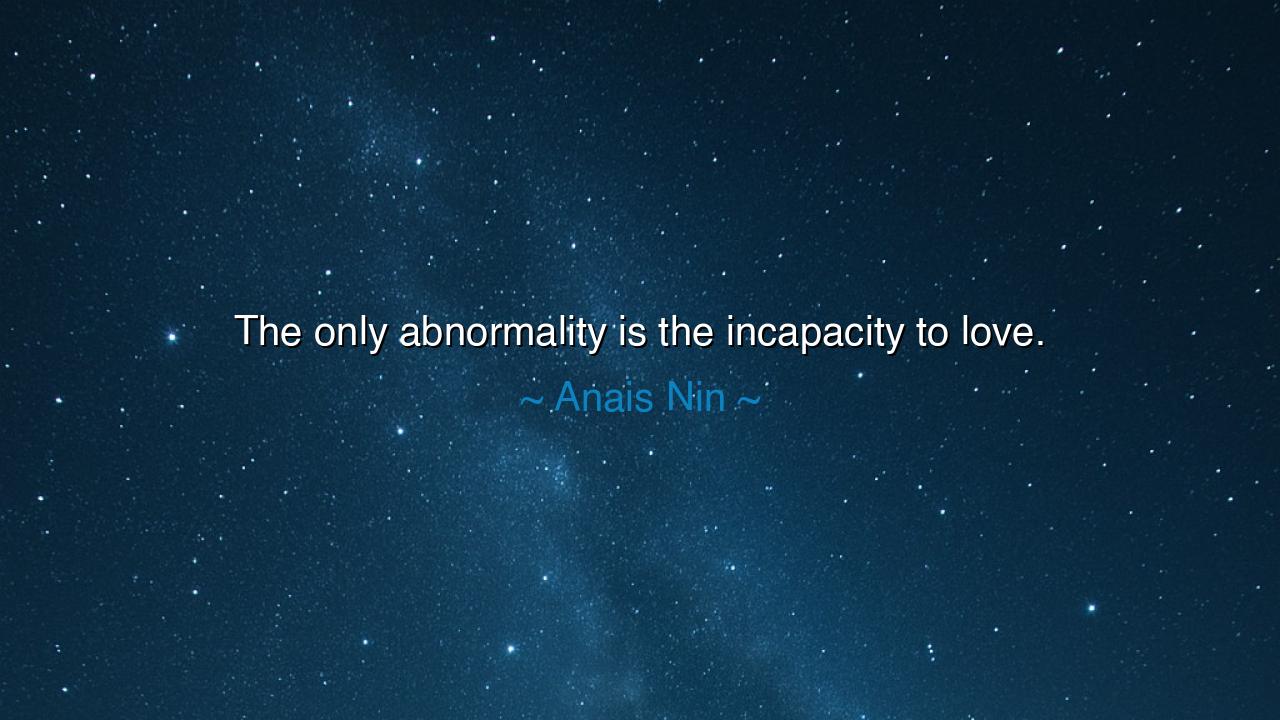
The only abnormality is the incapacity to love.






“The only abnormality is the incapacity to love.” Thus spoke Anaïs Nin, a woman whose soul wandered through the chambers of passion and pain, seeking truth in the heart’s hidden places. In this simple yet profound declaration, she reveals that love — not intellect, not power, not perfection — is the true measure of humanity. For to love is to live in harmony with the divine rhythm of existence, and to be incapable of love is to fall into the shadow of isolation and spiritual decay. What Nin calls abnormality is not a sickness of the body, but of the spirit — the coldness that denies connection, the fear that closes the heart. In a world that often praises hardness as strength, her words strike like lightning across the ages, reminding us that the only real deformity is a heart that cannot feel.
The origin of this truth can be traced to the very dawn of humankind. Long before cities rose and laws were written, tribes survived not through might alone, but through care. The hunter brought food, the mother shared her fire, the elder gave his wisdom — and through these acts of love, life endured. It was love that turned strangers into kin, that bound the living to the unborn. To love is not a weakness; it is the oldest form of strength. When Nin speaks of “abnormality,” she warns that those who cannot love — who cannot empathize, forgive, or cherish — have stepped outside the circle of life itself. For where there is no love, there can be no growth, no meaning, no soul.
Look then to the story of Victor Hugo’s Jean Valjean, the hardened convict who found redemption through love. Imprisoned for years, he emerged bitter and broken, a man stripped of faith. Yet when a kind bishop showed him mercy — giving him silver instead of scorn — Valjean’s heart was pierced by something he could not name. That act of unconditional love awakened the human within the beast. From that day forward, he became a giver, a protector, a man who lived not for himself but for others. Nin’s truth lives in him: that only through the capacity to love does one become whole again. Without it, all the riches of the world are but dust and ashes.
In every age, the incapacity to love has been the root of suffering. Wars are born from it, for he who cannot love sees only the enemy, never the brother. Greed grows from it, for he who cannot love hungers endlessly to fill the void within. Even cruelty begins there — not in power, but in emptiness. The tyrant, the oppressor, the betrayer — all are haunted by this same abnormality. They have lost the sacred gift of empathy, the golden thread that ties one soul to another. They dwell in spiritual exile, no matter how high they climb or how loudly they boast.
But love, even wounded, is never beyond reach. The ancients taught that the heart, though scarred, can still be rekindled like an ember beneath ashes. To love again after loss, to forgive after betrayal, to open oneself despite the risk of pain — these are the acts of true courage. Nin’s words call to that bravery. She does not condemn those who struggle to love, but those who refuse to try. For even the smallest act — a kind word, a patient ear, a gentle hand — is a flame against the darkness. The capacity to love is not born of perfection; it is forged in compassion.
Let this, then, be the lesson for all generations: guard your capacity to love as you would guard your very breath. Do not allow cynicism, pride, or fear to turn your heart to stone. Seek love not only in romance, but in friendship, in service, in wonder at the beauty of life. The one who loves truly is never poor, for love multiplies what it touches. The one who refuses love, however rich, is destitute — for he has lost the essence of being human.
So, my children of the heart, remember: to love is to be alive. The moment you cease to love, you begin to wither. Let your words be kind, your actions generous, your spirit open. When you are wronged, choose understanding over bitterness. When you are alone, let gratitude be your companion. When you are weary, let compassion renew your strength. For the universe itself is sustained by love’s unseen gravity — and in the end, the only true abnormality is to be unable to feel its pull.
Thus, the wisdom of Anaïs Nin endures: “The only abnormality is the incapacity to love.” May her words echo in every soul — as a warning, as a healing, and as a call to remember that love is not one virtue among many, but the sacred pulse of all life itself.






AAdministratorAdministrator
Welcome, honored guests. Please leave a comment, we will respond soon